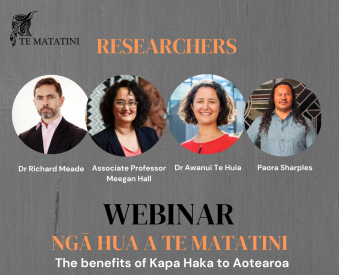2022 Jul 06 6:00 PM to 2022 Jul 06 7:00 PM

“Mana motuhake ki te kāinga. Matatū, Mataora, Matatini ki te ao.”
Research reports from leading Māori academics of Ngā Pae o Te Māramatanga – The University of Auckland, Te Wānanga o Raukawa and Te Herenga Waka – Victoria University of Wellington, confirm the benefits of kapa haka to the development and wellbeing of individuals and communities.
Ngā Hua a Te Matatini: The Benefits of Te Matatini was commissioned by Te Matatini Society Incorporated and Te Taura Whiri i te reo Māori in 2019, and is a collection of four evidence-based reports that focuses on four areas of the impact that kapa haka makes to the Māori health index, the economy of Aotearoa, the educational success of students who actively participate in kapa haka and the revitalisation of te reo Māori.
Te Wānanga o Raukawa reported that the material contribution of kapa haka to Māori health and wellbeing, in all of its dimensions—physical, spiritual, mental and social, was significant. It goes on to say that a substantial increase in Crown support would enable kapa haka participants and supporters to build on the extraordinary work that is already being done, generating further significant benefits which will extend well beyond Māori communities.
“Kapa haka is inclusive and an integral part of the values and norms that govern Māori society. The positive contributions that kapa haka makes to the social, cultural and economic wellbeing of our diverse communities are many,” says Carl Ross, Te Manahautū a Te Matatini.
Ngā Hua a Te Matatini research reports will be released and available to the public on Wednesday 6 July, at 5 AM on the Te Matatini and NPM websites respectively: tematatini.co.nz/our-process/publications/
To mark the release of the reports, Te Matatini and NPM are hosting a same-day webinar with researchers from 6pm – 7pm.